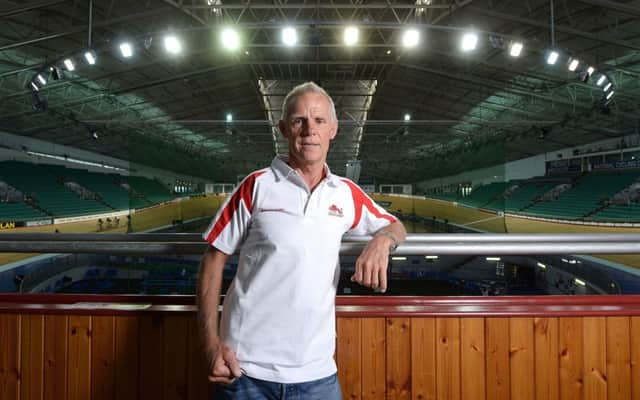Richard Moore: Sense of loss over Shane Sutton's departure


Lambert followed Sutton to his suite and fussed over him. “It’s the old man, isn’t it?” Sutton eventually asked and his manager nodded. Sutton’s father had died. Lambert asked if he could bring his dinner to the room but Sutton said no. He went to the dining room, told his team-mates: “Get your heads up boys, we’ve got a job to finish,” then went out and got drunk.
The next day’s stage was 170km to Carlisle. “I was swinging like a dunny door at the back,” Sutton said. “Nobody gave me any sympathy, but I didn’t want it.” He went on to win the Milk Race.
Advertisement
Hide AdAdvertisement
Hide AdWhen he first arrived in Britain, in 1984, the Australian lived with Mick Bennett, a former rider who these days is director of the Tour of Britain. Bennett lived in Birmingham but worked in London during the week and when he arrived home on a Friday evening Sutton “would open the door with an apron on and my dinner ready”.
On Saturday mornings Sutton would go training and stop at the pub on the way home. “I’d get calls from the pub to go and pick him up because he’d got in a fight,” Bennett says. “It was like that. But he came into my life at a very difficult moment for me because I’d lost my fiancée in a motor accident. Shane helped me through that period and I love him to death.”
Sutton settled in Britain, though his early and perhaps lasting impression was that British cyclists were “too soft”. When he retired he moved into coaching and he was brought into the British set-up in 2002 by Dave Brailsford. “I remember everyone really drew in their breath,” Brailsford said. “Shane’s a bit of a wild man, but what I saw in Shane more than anything was an empathy for the riders.”
At the time there were serious problems with the male sprint squad, which included Chris Hoy, and Sutton was employed as a troubleshooter: a diminutive, wiry, tough coach charged with standing up to and changing the culture in a group of big, heavily-muscled, testosterone-fuelled sprinters. Hoy was wary of Sutton at first but over time came to the view that, “he was the first person who really understood us as riders”.
Also in 2007, Hoy said: “He’s a person you never have a mediocre time with. It’s either great or horrendous, but it’s always intense. I mean, the number of times I’ve wanted to throttle the guy… part of me thinks we should have a fight, because that would settle it. But another part of me things he’d probably kick the hell out of me, even though he’s half my size.”
Sutton has always had a well-deserved reputation as a bruiser, a scrapper, a fighter. Naturally, there is more to him than that: he is abrasive and passionate, divisive and empathetic, funny and severe, and as Aussie as they come yet fully committed to the British team for the past 14 years. He could be caring and – as the past week’s allegations of sexist and discriminatory language suggest – deeply offensive. Less ambiguous is his intensity: he has no ‘off’ switch, and an addictive personality. “At one stage I found myself addicted to buying houses,” he once mentioned in passing.
Whatever has been said about Sutton in the past few days, and whatever he is alleged to have said, there is certainly worse out there – and also much better. At British Cycling there is relief that he has gone and also an enormous sense of loss and indeed sadness: opposing emotions that can co-exist in the same person. As one staff member put it, many are pleased and at the same time bereft. “He was a brilliant coach but his man management was terrible,” one staff member told me. “Bullying is a word that’s been used a lot but that’s a very emotive word. You did crave his approval. He could be a nightmare. But you’ve got to look at the people who appointed him.
“They knew what Shane was like but they took the good bits and ignored the bad bits. It was fine when Dave [Brailsford] was in charge, he reined him in. It was like Shane was on a leash and Dave was holding the leash, knowing how much to give him.”
Advertisement
Hide AdAdvertisement
Hide AdSteve Peters, the psychiatrist whose most challenging case might well have been Sutton, was also a member of Brailsford’s management team, and the three of them were like the legs of a stool. With all three in place there was balance. When Peters left, it wobbled. When Brailsford left, it collapsed. “Shane was like Jeremy Clarkson at the BBC,” said one staff member. “The BBC knew exactly what he was like but he was worth all the hassle because he brought in the ratings. British Cycling knew exactly what Shane was like but figured he was worth it.”
With Sutton gone it will be much quieter at the National Cycling Centre in Manchester. There will be a lightness about the place, which will make day-to-day life less stressful, more pleasant and less pressurised. It could make for a more relaxed and generally happier team. But without a leader who inspired fear and loyalty in his charges it could also mean fewer medals in Rio.